外研版初中英语各册知识点外研版
外研版七年级英语上册详细知识点汇总
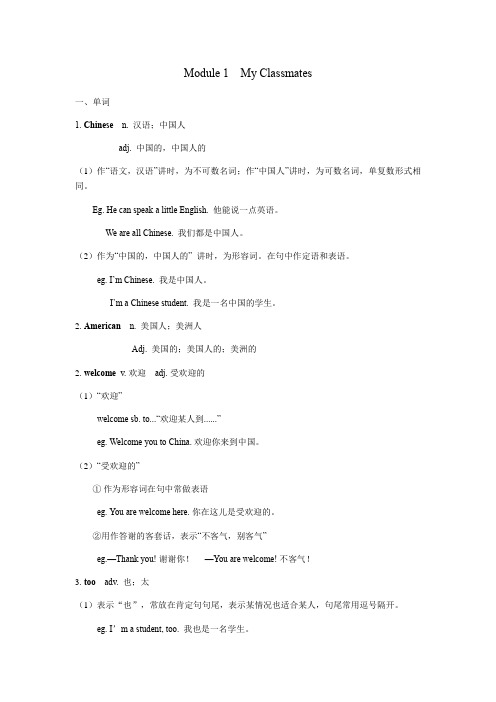
Module1 My Classmates一、单词1. Chinese n. 汉语;中国人adj. 中国的,中国人的(1)作“语文,汉语”讲时,为不可数名词;作“中国人”讲时,为可数名词,单复数形式相同。
Eg. He can speak a little English. 他能说一点英语。
We are all Chinese. 我们都是中国人。
(2)作为“中国的,中国人的” 讲时,为形容词。
在句中作定语和表语。
eg. I’m Chinese. 我是中国人。
I’m a Chinese student. 我是一名中国的学生。
2.American n. 美国人;美洲人Adj. 美国的;美国人的;美洲的2.welcome v.欢迎adj.受欢迎的(1)“欢迎”welcome sb.to...“欢迎某人到......”eg.Welcome you to China.欢迎你来到中国。
(2)“受欢迎的”①作为形容词在句中常做表语eg.You are welcome here.你在这儿是受欢迎的。
②用作答谢的客套话,表示“不客气,别客气”eg.—Thank you!谢谢你!—You are welcome!不客气!3.too adv. 也;太(1)表示“也”,常放在肯定句句尾,表示某情况也适合某人,句尾常用逗号隔开。
eg. I’m a student, too. 我也是一名学生。
(2)表示“太”,修饰形容词或副词的原级。
eg: The room is too big. 这个房间太小了。
二、基本句型1. ---What’s your name?你叫什么名字?---My name is.../I’m...我是......2.---Where are you from?/Where do you come from?你来自哪里? ---I’m from…/I come from...我来自...3. --- How old are you?你多大了? ---I’m...years old./I’m...我... 岁了。
外研版七年级英语上册M1-10重点知识大全
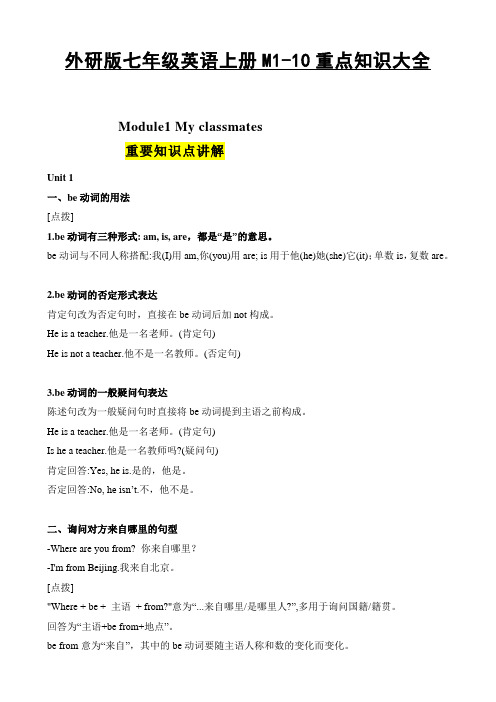
外研版七年级英语上册M1-10重点知识大全Module1 My classmates重要知识点讲解Unit 1一、be动词的用法[点拨]1.be动词有三种形式: am, is, are,都是“是”的意思。
be动词与不同人称搭配:我(I)用am,你(you)用are; is用于他(he)她(she)它(it);单数is,复数are。
2.be动词的否定形式表达肯定句改为否定句时,直接在be动词后加not构成。
He is a teacher.他是一名老师。
(肯定句)He is not a teacher.他不是一名教师。
(否定句)3.be动词的一般疑问句表达陈述句改为一般疑问句时直接将be动词提到主语之前构成。
He is a teacher.他是一名老师。
(肯定句)Is he a teacher.他是一名教师吗?(疑问句)肯定回答:Yes, he is.是的,他是。
否定回答:No, he isn’t.不,他不是。
二、询问对方来自哪里的句型-Where are you from? 你来自哪里?-I'm from Beijing.我来自北京。
[点拨]"Where + be + 主语+ from?"意为“...来自哪里/是哪里人?”,多用于询问国籍/籍贯。
回答为“主语+be from+地点”。
be from意为“来自”,其中的be动词要随主语人称和数的变化而变化。
三、用于确定对方国籍的句型-Hi, are you English too?嘿,你也是英国人吗?-No, I’m not. I’m American and my name is Betty King. 不,我不是。
我是美国人,我叫贝蒂·金。
[点拨]"Are you+国籍?"通常在没有把握确定对方国籍时用此句型。
该句是一般疑问句,肯定回答用“Yes,I am.”否定回答用“No,I'm not.”。
八年级上册外研版英语书笔记

八年级上册外研版英语书笔记外研版八年级上册英语书笔记。
一、Module 1 How to learn English。
(一)重点单词。
1. pair.- n. (相关的)两个人,一对,一双。
例如:a pair of shoes(一双鞋);a pair of glasses(一副眼镜)。
- 常见搭配:in pairs(成对地,成双地)。
2. correct.- v. 改正;纠正。
例如:Please correct your mistakes.(请改正你的错误。
)- adj. 正确的,对的。
其反义词为“incorrect”。
例如:The answer is correct.(答案是正确的)。
3. spelling.- n. 拼写。
例如:Your spelling should be improved.(你的拼写应该被提高。
)4. word.- n. 单词;词;话语。
例如:Learn these words by heart.(用心学习这些单词。
);He didn't say a word.(他一句话也没说。
)5. practice.- n. 练习。
是不可数名词。
例如:We need more practice.(我们需要更多的练习。
)- v. 练习,后接名词、代词或动名词。
例如:practice speaking English(练习说英语)。
(二)重点短语。
1. look up.- 查;查找。
例如:Look up the new words in the dictionary.(在字典里查找新单词。
)2. make a mistake/make mistakes.- 犯错误。
例如:Don't be afraid of making mistakes.(不要害怕犯错误。
)3. write down.- 写下;记下。
例如:Write down your name and address.(写下你的名字和地址。
外研版七年级上册英语全册知识点归纳

外研版七年级上册英语全册知识点归纳MODULE 1一、同义句1.My name's Daming. = I'm Daming.2.I'm from England. = I come from England.3.Are you a new student?≈ Are you new?4.Nice to meet you. = Nice to see you. =Glade to meet you. = Glade to see you.5.What's your name ? = May I have your name?二、特殊疑问句1. 询问姓名:—What's your name?—My name is .... = I’m⋯⋯—What's his/her name?—His/her name is .... = He/She is2. 询问年龄:— How old are you? = Can you tell me your age?= What's your age?— I'm twelve years old.3.询问来自哪里:—Where are you from? —I'm from...—Where is he/she from? —He’s/She ’s from...— Are you from China ?—Yes, I am/ we are. No, I’m not/ we aren’t.4.询问在哪个班:—What class are you in? —I'm in Class One, Grade Seven.三、单词1.China —Chinese America—American England—English capitalcity2.small— big first —last everyone all四、语法1. 代词人称代词主格I you he she it we you they动词 :形容词性物主代词(⋯的) my your his her its our your their 2.beam I am= I’m I am not= I’m not1is He /She is = He ’s /She’s is not = isn’tare We /You /They are = We’re / You’re /They’re are not= aren’t MODULE 2一、单词grandparents grandfather—grandmother parents father—mothermum---dad daughter —son sister —brother aunt —uncle cousin husband---wife family woman---man women---men职业:job actor driver doctor manager nurse worker teacherpoliceman 工作地点:factory hospital hotel office school theatre busstation shop 二、短语a photo/picture of my family in front of in/at the front of next to on the right---on the left三、语法1.this---that these---those I---we he/she/it---they2.名词所有格:Miss Li' s =her Tom ’s = hisLily and Lucy's两人共有的 eg: Lily and Lucy's desk is bigLily's and Lucy's两人各有的 Lily's and Lucy's desks are small.My parents’ room is very clean.四、句子1.---Is this your sister? ---Yes, it is. No, it isn’t---Are these her books? ---Yes, th ey are. No, they aren’t.2.---Who is this? --- This is my brother.--- Who are they/these? --- They are my cousins3. --- What’s your sister’s name?--- My sister’s name is⋯/Her name is ⋯4.---What does your father do?=What is your father's job?=What isyour father?---He is a ...MODULE 3一、单词1.buildings: classroom, dining/sports hall, library, office, science lab, playground2is He /She is = He’s /She’s is not =isn’tare We /You /They are = We’re /You’re/They’re arenot= aren’tMODULE 2一、单词grandparents grandfather—grandmother parents father—mothermum---dad daughter —son sister —brotheraunt —uncle cousin husband---wifefamily woman---man women---men职业: job actor driver doctor managernurse worker teacher policeman工作地点: factory hospital hotel officeschool theatre bus station shop二、短语a photo/picture of my family in front ofin/at the front of next to on the right---on the left三、语法1.this---that these---those I---wehe/she/it---they2.名词所有格:Miss Li' s =her Tom ’s = hisLily and Lucy's两人共有的 eg: Lily and Lucy's desk is bigLily's and Lucy's两人各有的 Lily's and Lucy's desks are small.My parents’ room is very clean.四、句子1.---Is this your sister? ---Yes, it is. No, it isn’t---Are these her books? ---Yes, th ey are. No, they aren’t.2.---Who is this? --- This is my brother.--- Who are they/these? --- They are my cousins3. --- What’s your sister’s name?--- My sister’s name is⋯/Her name is ⋯4.---What does your father do?=What isyour father's job?=What is yourfather?---He is a ...MODULE 3一、单词1.buildings: classroom, dining/sportshall, library, office, science lab, playground2is He /She is = He’s /She’s is not =isn’tare We /You /They are = We’re /You’re/They’re arenot= aren’tMODULE 2一、单词grandparents grandfather—grandmother parents father—mothermum---dad daughter —son sister —brotheraunt —uncle cousin husband---wifefamily woman---man women---men职业: job actor driver doctor managernurse worker teacher policeman工作地点: factory hospital hotel officeschool theatre bus station shop二、短语a photo/picture of my family in front ofin/at the front of next to on the right---on the left三、语法1.this---that these---those I---wehe/she/it---they2.名词所有格:Miss Li' s =her Tom ’s = hisLily and Lucy's两人共有的 eg: Lily and Lucy's desk is bigLily's and Lucy's两人各有的 Lily's and Lucy's desks are small.My parents’ room is very clean.四、句子1.---Is this your sister? ---Yes, it is. No, it isn’t---Are these her books? ---Yes, th ey are. No, they aren’t.2.---Who is this? --- This is my brother.--- Who are they/these? --- They are my cousins3. --- What’s your sister’s name?--- My sister’s name is⋯/Her name is ⋯4.---What does your father do?=What isyour father's job?=What is yourfather?---He is a ...MODULE 3一、单词1.buildings: classroom, dining/sportshall, library, office, science lab, playground2is He /She is = He’s /She’s is not =isn’tare We /You /They are = We’re /You’re/They’re arenot= aren’tMODULE 2一、单词grandparents grandfather—grandmother parents father—mothermum---dad daughter —son sister —brotheraunt —uncle cousin husband---wifefamily woman---man women---men职业: job actor driver doctor managernurse worker teacher policeman工作地点: factory hospital hotel officeschool theatre bus station shop二、短语a photo/picture of my family in front ofin/at the front of next to on the right---on the left三、语法1.this---that these---those I---wehe/she/it---they2.名词所有格:Miss Li' s =her Tom ’s = hisLily and Lucy's两人共有的 eg: Lily and Lucy's desk is bigLily's and Lucy's两人各有的 Lily's and Lucy's desks are small.My parents’ room is very clean.四、句子1.---Is this your sister? ---Yes, it is. No, it isn’t---Are these her books? ---Yes, th ey are. No, they aren’t.2.---Who is this? --- This is my brother.--- Who are they/these? --- They are my cousins3. --- What’s your sister’s name?--- My sister’s name is⋯/Her name is ⋯4.---What does your father do?=What isyour father's job?=What is yourfather?---He is a ...MODULE 3一、单词1.buildings: classroom, dining/sportshall, library, office, science lab, playground2is He /She is = He’s /She’s is not =isn’tare We /You /They are = We’re /You’re/They’re arenot= aren’tMODULE 2一、单词grandparents grandfather—grandmother parents father—mothermum---dad daughter —son sister —brotheraunt —uncle cousin husband---wifefamily woman---man women---men职业: job actor driver doctor managernurse worker teacher policeman工作地点: factory hospital hotel officeschool theatre bus station shop二、短语a photo/picture of my family in front ofin/at the front of next to on the right---on the left三、语法1.this---that these---those I---wehe/she/it---they2.名词所有格:Miss Li' s =her Tom ’s = hisLily and Lucy's两人共有的 eg: Lily and Lucy's desk is bigLily's and Lucy's两人各有的 Lily's and Lucy's desks are small.My parents’ room is very clean.四、句子1.---Is this your sister? ---Yes, it is. No, it isn’t---Are these her books? ---Yes, th ey are. No, they aren’t.2.---Who is this? --- This is my brother.--- Who are they/these? --- They are my cousins3. --- What’s your sister’s name?--- My sister’s name is⋯/Her name is ⋯4.---What does your father do?=What isyour father's job?=What is yourfather?---He is a ...MODULE 3一、单词1.buildings: classroom, dining/sportshall, library, office, science lab, playground2are We /You /They are = We’re /You’re/They’re arenot= aren’tMODULE 2一、单词grandparents grandfather—grandmother parents father—mothermum---dad daughter —son sister —brotheraunt —uncle cousin husband---wifefamily woman---man women---men职业: job actor driver doctor managernurse worker teacher policeman工作地点: factory hospital hotel officeschool theatre bus station shop二、短语a photo/picture of my family in front ofin/at the front of next to on the right---on the left三、语法1.this---that these---those I---wehe/she/it---they2.名词所有格:Miss Li' s =her Tom ’s = hisLily and Lucy's两人共有的 eg: Lily and Lucy's desk is bigLily's and Lucy's两人各有的 Lily's and Lucy's desks are small.My parents’ room is very clean.四、句子1.---Is this your sister? ---Yes, it is. No, it isn’t---Are these her books? ---Yes, th ey are. No, they aren’t.2.---Who is this? --- This is my brother.--- Who are they/these? --- They are my cousins3. --- What’s your sister’s name?--- My sister’s name is⋯/Her name is ⋯4.---What does your father do?=What isyour father's job?=What is yourfather?一、单词1.buildings: classroom, dining/sportshall, library, office, science lab, playground2are We /You /They are = We’re /You’re/They’re arenot= aren’tMODULE 2一、单词grandparents grandfather—grandmother parents father—mothermum---dad daughter —son sister —brotheraunt —uncle cousin husband---wifefamily woman---man women---men职业: job actor driver doctor managernurse worker teacher policeman工作地点: factory hospital hotel officeschool theatre bus station shop二、短语a photo/picture of my family in front ofin/at the front of next to on the right---on the left三、语法1.this---that these---those I---wehe/she/it---they2.名词所有格:Miss Li' s =her Tom ’s = hisLily and Lucy's两人共有的 eg: Lily and Lucy's desk is bigLily's and Lucy's两人各有的 Lily's and Lucy's desks are small.My parents’ room is very clean.四、句子1.---Is this your sister? ---Yes, it is. No, it isn’t---Are these her books? ---Yes, th ey are. No, they aren’t.2.---Who is this? --- This is my brother.--- Who are they/these? --- They are my cousins3. --- What’s your sister’s name?--- My sister’s name is⋯/Her name is ⋯4.---What does your father do?=What isyour father's job?=What is yourfather?一、单词1.buildings: classroom, dining/sportshall, library, office, science lab, playground。
外研版英语九年级上册知识点总结
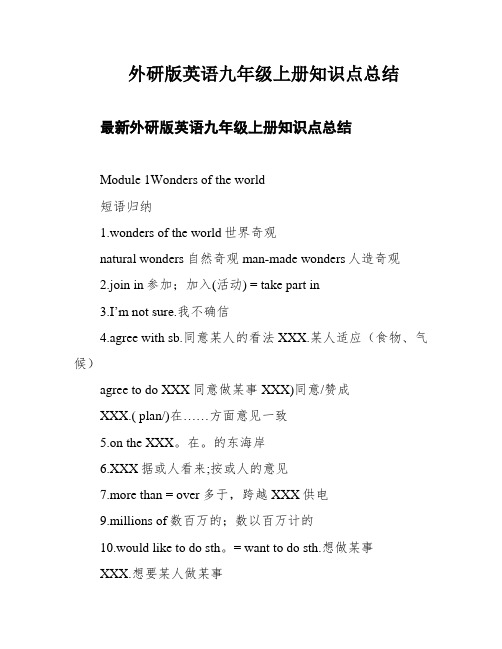
外研版英语九年级上册知识点总结最新外研版英语九年级上册知识点总结Module 1Wonders of the world短语归纳1.wonders of the world世界奇观natural wonders自然奇观man-made wonders人造奇观2.join in参加;加入(活动) = take part in3.I’m not sure.我不确信4.agree with sb.同意某人的看法XXX.某人适应(食物、气候)agree to do XXX同意做某事XXX)同意/赞成XXX.( plan/)在……方面意见一致5.on the XXX。
在。
的东海岸6.XXX据或人看来;按或人的意见7.more than = over多于,跨越XXX供电lions of数百万的;数以百万计的10.would like to do sth。
= want to do sth.想做某事XXX.想要某人做某事11.early morning大清早12.XXX变成灰色13.get out of。
从。
出来14.go through意为“穿过,夸大从物体内部穿过”;重新至尾的操演15.fall XXX忽然向下倾斜16.look over从(某物上面)看过去:仔细检查look across远望look down to俯视;向下看24.wait for等候25.dozens of许多26.in height高度;在高度上用法集萃1.XXX XXX同意某人agree to do XXX同意做某事2.would like to do XXX想要做某事4.XXX以及have been in的区别5.because of+名词因为。
6.XXX没有做某事7.XXX.害怕做某事19.look forward to doing XXX盼望做某事Module 2Publicholidays发给中央短语归纳1.since then从那当前2.have a three-day holiday有三天的假期3.public holiday公众假日4.have one day off有一天的休息时间5.all kinds of各种各样的6.XXX度假介词短语:XXXHe is going to take a vacation to Beijing。
外研版英语八年级上册所有知识点总结

• 15.all the time 一直
Module1——重点句型
• 一、提建议的句子: • 1.You(We) should do sth • 2.Let’s do sth • 3.Why not do sth • 4.Why don’t you(we) do sth • 5.How(What) about doing
• …for …有什么用
• 4. arrive at 到达(后接小地点) • 15. take…out of… 从…拿
• 5. once or twice 偶尔,一两次
出…
• 6. go off (灯)熄灭,(闹钟)响起 • 16. go across the road=
• 7.remember to do sth 记得去做某事
• 8. in the east of 在……的东部 • 9.be famous for=be known for • 因……而闻名 • 10.such as 比如 • lions of 数百万的 • 12.on the coast 在海滨,在海岸 • 13.be popular for 因…而受欢
• 7. on one’s way to…
• cross the road 过马路
• 在某人去…的路上
• 17. see/watch/hear sb do sth
• 8. run after 追逐,追赶
看见/听见某人做过某事
• 9. stop doing sth 停止做某事 • see/watch/hear sb doing sth • 看见/听见某人正在做某事
Module 8 重点词组
• 1. in time 及时 • 2. fall off… 从…跌落 • 3. pay attention 注意 • 4. pay attention to doing sth
外研社版九年级英语知识点
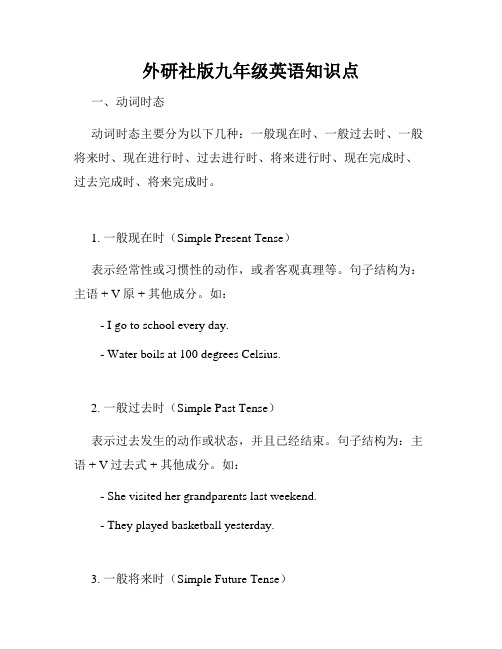
外研社版九年级英语知识点一、动词时态动词时态主要分为以下几种:一般现在时、一般过去时、一般将来时、现在进行时、过去进行时、将来进行时、现在完成时、过去完成时、将来完成时。
1. 一般现在时(Simple Present Tense)表示经常性或习惯性的动作,或者客观真理等。
句子结构为:主语 + V原 + 其他成分。
如:- I go to school every day.- Water boils at 100 degrees Celsius.2. 一般过去时(Simple Past Tense)表示过去发生的动作或状态,并且已经结束。
句子结构为:主语 + V过去式 + 其他成分。
如:- She visited her grandparents last weekend.- They played basketball yesterday.3. 一般将来时(Simple Future Tense)表示将来要发生的动作或状态。
句子结构为:主语 + will + V 原 + 其他成分。
如:- I will buy a new car next year.- They will have a party on Friday.4. 现在进行时(Present Continuous Tense)表示现在正在进行的动作,常与时间状语连用。
句子结构为:主语 + am/is/are + V-ing + 其他成分。
如:- She is reading a book now.- They are playing soccer in the park.5. 过去进行时(Past Continuous Tense)表示过去某一时刻正在进行的动作。
句子结构为:主语 + was/were + V-ing + 其他成分。
如:- He was studying when I called him.- They were watching a movie at that time.6. 将来进行时(Future Continuous Tense)表示将来某一时刻正在进行的动作。
最新外研版七年级英语上册各单元知识点汇总(全册)
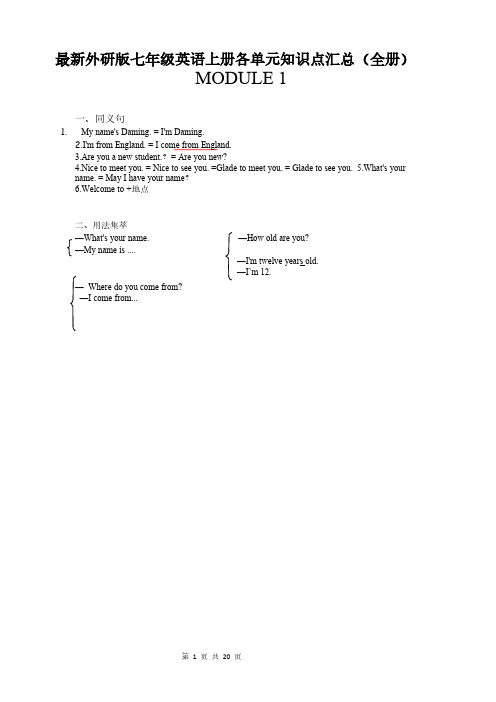
最新外研版七年级英语上册各单元知识点汇总(全册)MODULE 1一、同义句1.My name's Daming. = I'm Daming.2.I'm from England. = I come from England.3.Are you a new student.?= Are you new?4.Nice to meet you. = Nice to see you. =Glade to meet you. = Glade to see you.5.What's your name. = May I have your name ?6.Welcome to +地点二、用法集萃—What's your name.—How old are you?—My name is ....— Where do you come from?—I come from...—I'm twelve years old.—I’m 12.—Where are you from?—What class are you in?—I'm from...—I'm in Class One, Grade One.—What about ...?—What about doing ...?=How about doing ...?With 和 andJim and Lily go to the bank.(and 表并列)Jim with Lily goes to the bank.(with 是介词,和...一起,动词的形式 要与 with 前面的主语一致)三 语法专项。
Be 动词用法口诀我用 am 你用 are,is 跟着他,她,它. 单数名词用 is ,复数名词全用 are. 变疑问,往前提,句末问号莫丢弃。
变否定,更容易,be 后 not 莫忘记。
否定疑问任你变,句首大写莫迟疑。
外研版初中英语语法目录+

Module 1 My classmates重点:1.含be 动词句子的陈述句、否定句、一般疑问句2.人称代词和物主代词Module 2 My family重点:1.指示代词("this , that , these , those "的用法)2.名词所有格Module 3 My school重点:1.There be句型(就近原则);否定句,一般疑问句,特殊疑问句。
2.方位介词Module 4 Healthy food重点:1.Have/Has got句型的用法,句型转换2.some,any的用法Module5 My school day重点:1.行为动词一般现在时的肯定否定疑问形式2.时间的表示方法;以及介词at、in、on 表时间Module 6 A trip to the zoo重点:1.一般现在时行为动词第三人称单数的一般疑问句及其肯定和否定回答。
2.总结一般现在时的用法Module7 Computers重点:1.学会运用first, next, then, finally2.疑问词when, where, how等引导的一般现在时的特殊疑问句Module 8 Choosing presents重点:1.学会用频率副词(always, often, sometimes, never, usually)2. “Would you like to…”句型Module 9 People and places重点:现在进行时态Module 10 Spring Festival重点:现在进行时的特殊疑问句、一般疑问句及其肯定、否定回答。
M11、名词所有格2、物主代词3、描述人物,会写失物招领M21、情态动词can的用法,及转变为否定句、一般疑问句及肯定回答和否定回答2、用can会描述自己会做什么(比如球类和乐器)M31、一般将来时表达方法———be going to2、一般将来时的时间状语3.一般将来时转变为否定句、一般疑问句和特殊疑问句M41.一般将来时表达方法——will2.一般将来时变否定句、一般疑问句和肯定回答和否定回答M51.特殊疑问词2.特殊疑问句M6表示方向的方位介词M7 、M8、M9、M10一般过去式M11 祈使句M12 选择疑问句Module 1 How to learn English回顾:一般现在时,一般过去时,一般将来时,现在进行时Unit 1 Let’s try to speak English as much as possible.Unit 2 You should smile at her!知识点:提建议句型Module 2 My home town and my country形容词比较级(1)Unit 1 It’s taller than many other buildings.Unit 2 Cambridge is a beautiful city in the east of England.知识点:It做形式主语句型;关于人口的表达及问法Module 3 Sports形容词比较级(2)、副词的基本用法和副词的比较级Unit 1 Nothing is more enjoyable than playing tennis.Unit 2 This year we are training more carefully知识点:So .....that.... such....that......Module 4 Planes , ships and trains形容词、副词的最高级Unit 1 He lives the farthest from school.Unit 2 What is the best way to travel?Module 5 Lao She Teahouse动词不定式和双宾语Unit 1 I wanted to see Beijing Opera.Unit 2 It describes the changes in Chinese society.Module 6 Animals in danger动词不定式(2)Unit 1 It allows people to get closer to themUnit 2 The WWF is working hard to save them all.知识点:need的用法Module 7 A famous story过去进行时(2)Unit 1 Alice was sitting with her sister by the river.Unit 2 She was thinking about her cat.Module 8 Accidents过去进行时(2)Unit 1 While the lights were changing to red, a car suddenly appeared. Unit 2 I was trying to pick it up when it bit me again.Module 9 Population冠词和数字Unit 1 The population of China is about 1.37 billion.Unit 2 Arnwick was a city with 200,000 people.Module 10 The weather情态动词may/might表示可能Unit 1 It might snow.Unit 2 The weather is fine all year round.Module 11 Way of life情态动词must,can,need等Unit 1 In China, we open a gift later.Unit 2 In England, you usually drink tea with milk.Module 12 Help祈使句和情态动词must,can,could表示推测Unit 1 What should we do before help arrives?Unit 2 Stay away from windows and heavy furniture.八下目录M1 感官系动词look feel taste smell soundM2 现在完成时1 用法、构成M3 现在完成时2 have been to /have gone to/have been in ;时间状语M4 现在完成时3 短暂性动词的转化M5 一般现在时、一般过去时、现在完成时的区别M6 英语基本句型M7 并列句and but orM8 that 引导的宾语从句M9 whether/if及疑问词引导的宾语从句M10 宾语从句的时态问题九上Module1 Wonders of the worldUnit 1 It’s more than 2,000 years old.Unit 2 The Grand Canyon was not just big.语法点:时态复习:一般现在时,一般过去时,一般将来时,现在进行时,过去进行时,现在完成时Module 2 Public HolidaysUnit 1 My family always go somewhere interesting as soon as the holiday begins.Unit 2 We have celebrated the festival since the first pioneers arrived in America.语法点:时间状语从句:when, as soon as, before\after, while, until, sinceModule 3 HeroesUnit 1 She trained hard, so she became a great player laterUnit 2 There were few doctors, so he had to work very hard on his own语法点:原因、目的和结果状语从句:because,since, so that, soModule 4 Home aloneUnit 1 I can look after myself, although it won’t be easy for meUnit 2 I became so bored with their orders that I wished they would leave me alone.语法点:结果状语从句和让步状语从句:so...that..., although/though,Module 5 MuseumsUnit 1 Don’t cross that rope!Unit 2 If you ever go to London, make sure you visit the Science Museum语法点:状语从句:if从句+祈使句;表示“禁止做某事”:no+动名词;no+名词;祈使句Module 6 ProblemsUnit 1. If I start after dinner, I’ll finish it before I go to bed.Unit 2 If you tell him the truth now, you will show that you are honest.语法点:if引导的条件状语从句(主将从现);Module 7 Great booksUnit 1 We’re still influenced by Confucius’s ideasUnit 2 It is still read and loved语法点:一般现在时的被动语态Module 8 Sports lifeUnit 1 Daming wasn’t chosen for the team last yearUnit 2 He was invited to competitions around the world.语法点:一般过去时的被动语态Module 9 Great inventionsUnit 1 Will computers be used more than books in the future?Unit 2 Will books be replaced by the Internet?语法点:被动语态语法汇总Module 10 AustraliaUnit 1 I have some photos that I took in Australia last yearUnit 2 The game that they like most is Australian football语法点:that引导的定语从句Module 11 PhotosUnit 1 He’s the boy who won the photo competition last year!Unit 2 The photo which we liked best was taken by Zhao Min语法点:which和who引导的定语从句Module 12 Save our worldUnit 1 If everyone starts to do something, the world will be saved.Unit 2 Repeat these three words daily: reduce, reuse and recycle.语法点:构词法:合成法;派生法;转化法九下1 名词、冠词、数词2 代词3 形容词副词4 情态动词5 时态复习6 被动语态7 状语从句和动词不定式8 宾语从句定语从句。
外研版英语九年级上册知识点总结(精华版)

九年级英语上册知识点总结Module1 Wonders of the world一、重点短语1.wonders of the world世界奇观2.natural wonders自然奇观3.join in = take part in参加;加入(活动)4.agree with sb.同意某人的看法5. agree to do sth.同意做某事6.in one’s opinion依某人看来;按某人的意见7.more than = over多于,超过8. millions of数百万的;数以百万计的9.produce electricity供电10.would like to do sth. = want to do sth.想做某事11.get out of...从....出来12.become grey变成灰色13.look across眺望, 向对面看14.look down to俯视;向下看15.go down下去;下沉;坠落16.look over从(某物上面)看过去:仔细检查17. go through穿过,经历,经受,浏览18.at the bottom of在.....的底部19.on both sides在两边20.in height高度;在高度上21. do an interview with sb.采访某人22.draw a picture of画一副......的图画23.fall away突然向下倾斜24.wait for等候25.dozens of许多26.be famous for以.......而闻名二、固定结构1. sb./sth agrees with sth.某人/某物适应(食物、气候)/符合某物,I don't think the food here agrees with me. 我觉得这里的食物不对我的胃口His explanation agrees with the facts of the situation.他的解释与实情相符。
七年级上册外研版英语课堂笔记

七年级上册外研版英语课堂笔记一、Module 1 My classmates。
1. 重点单词。
- nice:adj. 美好的;令人愉快的。
例如:She is a nice girl.(她是一个好女孩。
)- to:prep. 到;向。
例如:Welcome to Beijing.(欢迎来到北京。
)- meet:v. 遇见;结识。
例如:Nice to meet you.(很高兴见到你。
)- classmate:n. 同学。
例如:He is my classmate.(他是我的同学。
)- his:pron. 他的。
例如:His name is Tom.(他的名字是汤姆。
)- her:pron. 她的。
例如:Her book is very interesting.(她的书非常有趣。
)2. 重点短语。
- be from:来自。
例如:I am from China.(我来自中国。
)- Nice to meet you:很高兴见到你。
这是初次见面时常用的打招呼用语,回答通常是“Nice to meet you too”。
3. 重点句型。
- What's your name? 你叫什么名字?这是询问他人名字的常用句型,回答可以是“My name is...”或者“I'm...”。
- I'm from... 我来自……,用来介绍自己的籍贯。
例如:I'm from Shanghai.(我来自上海。
)二、Module 2 My family。
- family:n. 家;家庭。
例如:This is my family.(这是我的家庭。
)- father:n. 父亲;爸爸。
例如:My father is a teacher.(我的爸爸是一名教师。
)- mother:n. 母亲;妈妈。
例如:My mother likes cooking.(我的妈妈喜欢做饭。
)- sister:n. 姐妹。
例如:My sister is a student.(我的姐姐是一名学生。
外研版初中英语各册知识点(外研版)

初一上册各模块知识点及考试重点名词所所有格:⑴表示有生命的名词的所有格其单数形式是加 's, students' rooms, father's shoes。
(2). 如复数结尾不是s的仍加 's,如:Children's Day。
(3). 在表示时间、距离、长度、重量、价格、世界、国家等名词的所有格要用 's,例如:a twenty minutes' walk,ten miles' journey,a boat's length,two pounds' weight, ten dollars' worth。
(4). 无生命名词的所有格则必须用of结构,例如:a map of China,the end of this term,the capital of our country, the color of the flowers。
特殊情况:the key to the door/ the answer to the questionthe ticket for the concert(5). 双重所有格,例如:a friend of my father's。
【注意】如果两个名词并列,并且分别有 's,则表示“分别有”,例如:John's and Mary's rooms(约翰和玛丽各有一间,共两间);Tom's and Mary's bikes(两人各自的自行车)。
两个名词并列,只有一个's,则表示“共有”,例如:John and Mary's room (约翰和玛丽共有一间);Tom and Mary's mother(即Tom与Mary是兄妹)。
名词复数的不规则变化单复数通同形:人们说汉语和日语,瑞士人喜欢绵羊、鹿和雨fish 、sheep、deer、people、Chinese、English不规则变化:男女孩子的脚,踩住老鼠的牙Women、 men 、feet、 mice、 teeth1、would的用法①Would you like to do sth?你愿意干某事吗?提出建议邀请,如果同意,用YES,I’d love to./all right /A good idea.如果拒绝,也要客气的回绝。
(完整版)外研版初中英语知识点汇总
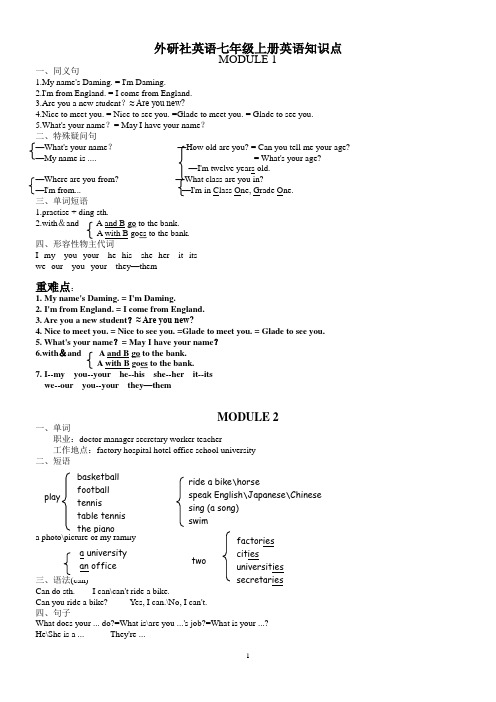
外研社英语七年级上册英语知识点MODULE 1一、同义句1.My name's Daming. = I'm Daming.2.I'm from England. = I come from England.3.Are you a new student?≈ Are you new?4.Nice to meet you. = Nice to see you. =Glade to meet you. = Glade to see you.5.What's your name?= May I have your name?二、特殊疑问句—What's your name?—How old are you? = Can you tell me your age?—My name is ....= What's your age?—I'm twelve years old.—Where are you from? —What class are you in?—I'm from... —I'm in Class One, Grade One.三、单词短语1.practise + ding sth.2.with&and A and B go to the bank.A withB goes to the bank.四、形容性物主代词I--my you--your he--his she--her it--itswe--our you--your they—them重难点:1. My name's Daming. = I'm Daming.2. I'm from England. = I come from England.3. Are you a new student?≈ Are you new?4. Nice to meet you. = Nice to see you. =Glade to meet you. = Glade to see you.5. What's your name?= May I have your name?6.with&and A and B go to the bank.A withB goes to the bank.7. I--my you--your he--his she--her it--itswe--our you--your they—themMODULE 2一、单词职业:doctor manager secretary worker teacher工作地点:factory hospital hotel office school university三、语法Can do sth. I can\can't ride a bike.Can you ride a bike? Yes, I can.\No, I can't.四、句子What does your ... do?=What is\are you ...'s job?=What is your ...?He\She is a ... They're ...重难点:1. play 与不同的名词搭配时所表达的意思是不同的,play 与球类搭配时是不需要加定冠词the ,如:playfootball ,basketball ,volleyball and so on.Play 与乐器搭配时是需要加定冠词the ,如:play the piano ,the guitar and so on.2. 固定搭配:ride a bike/horse,speak English/Japanese/Chinese,sing a song,swim.3. 不定冠词a 与an 的用法4. 语法知识:Can 的用法 Can do sth Can+主语+do sth ? Yes ,主语+can./No ,主语+can ’t. I can ’t do sth.5. What does your ... do?=What is\are you ...'s job?=What is your ...? He\She is a ... They're ...MODULE 3一、单词1.buildings in school: classroom dining hall gym library office science lab2.something: blackboard book classroom computer desk dictionary football library picture television3.numbers: thirteen fourteen fifteen sixteen seventeen eighteen nineteen thirty forty fifty sixty seventy eighty ninety4.介词:next to ≈ near behind ≠ in front of in on under5. in front of:在......前面in the front of:在......里面的前面 6.right 正确的≠wrong 右边的≠left二、语音 er 、or 、ur 发/ə/ 三、语法(There be)----Are there any school offices?----Yes, there are. There are some offices. ----Is there a computer on Miss Li's desk?----No, there isn't.注意:1.就近原则:There is some meat and two apple on the desk. 2.名词所有格: Miss Li's herLily and Lucy's 两人共有的 eg: Lily and Lucy's father. Lily's and Lucy's 两人各有的 Lily's and Lucy's fathers.重难点:1.重要单词: classroom dining hall gym library office science lab blackboard book classroom computer desk dictionary football library2.介词的用法: next to ≈ near behind ≠ in front of in on under3.in front of 与 in the front of 的区别4.语法知识: ----Are there any school offices? ----Yes, there are. There are some offices. ----Is there a computer on Miss Li's desk?----No, there isn't.就近原则:5.名词所有格:MODULE 4一、family members:aunt uncle grandma grandmother grandpa grandfather mother father mum dad sister brother 二、短语句型Thank you for your email. your help. helping me.asking me.inviting me. Make a family tree for your family.----How many people are there in your family?----There are four. There are my mum and dad, my sister and me. ----Have you got an aunt?/any .....? ----Yes,I have./No,I haven't.选择疑问句)or 的用法:① 或; ② 并列否定:I don't like swimming or dancing.重难点:1.重要单词: aunt uncle grandma grandmother grandpa grandfather mother father mum dad sister brother2.重要短语:Thank you for doing sth./Thanks for doing sth.3.have got 的用法4.重难点: or 的用法:① 或; ② 并列否定:I don't like swimming or dancing.MODULE 5-6一、单词1. orange 橙汁 have some orange [U ] 橙色 the oranges are orange [C ] 橙子 This is an orange [C ]2.Kind 善良 He is very kind.种类=type a kind / type of fruit two kinds /types of fruits1. 重要单词:orange 三个不同的含义,health(n.)与healthy(adj.)的区分.2. 重要短语与句型:详见知识点概括MODULE 7一、短语get up≠go to bedgo home≠leave home(for)study science/history/chemistry/maths/...二、语法 ①时间表达法:②一般现在时(1)【No. 1】一般现在时的功能usually 、always 、often 、never + n.be + usually 、always 、often 、never1.表示事物或人物的特征、状态。
初一英语外研版知识点
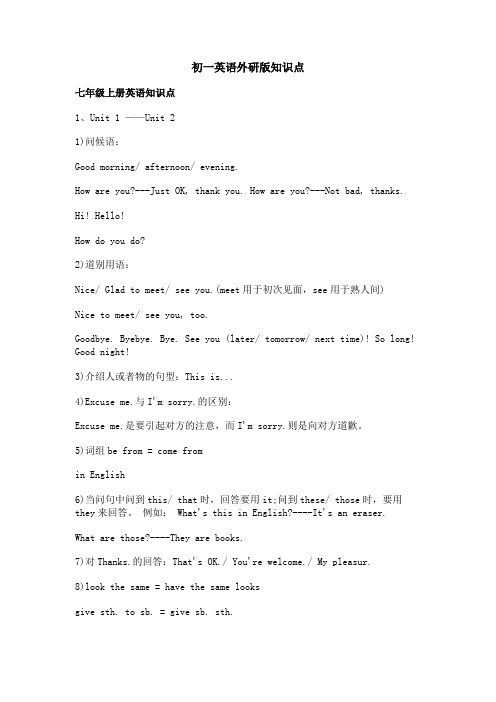
初一英语外研版知识点七年级上册英语知识点1、Unit 1 ——Unit 21)问候语:Good morning/ afternoon/ evening.How are you?---Just OK, thank you. How are you?---Not bad, thanks.Hi! Hello!How do you do?2)道别用语:Nice/ Glad to meet/ see you.(meet用于初次见面,see用于熟人间)Nice to meet/ see you, too.Goodbye. Byebye. Bye. See you (later/ tomorrow/ next time)! So long! Good night!3)介绍人或者物的句型:This is...4)Excuse me.与I'm sorry.的区别:Excuse me.是要引起对方的注意,而I'm sorry.则是向对方道歉。
5)词组be from = come fromin English6)当问句中问到this/ that时,回答要用it;问到these/ those时,要用they来回答。
例如: What's this in English?----It's an eraser.What are those?----They are books.7)对Thanks.的回答:That's OK./ You're welcome./ My pleasur.8)look the same = have the same looksgive sth. to sb. = give sb. sth.be like = look likein the tree/ on the tree (树上结的、长出来的用on,否则用in)in red(穿着红色的衣服)in the desk(在空间范围之内)in English(用英语)help sb. do sth.初一年级英语下册复习资料基数词的部分用法1、表顺序。
外研版初中英语七年级上册-九年级下册知识点总结整理

1.七上1-52.Chinese 名词和形容词词性3.First 序数词用法副词用法4.Family的主谓一致5.Health 身体健康对健康有益保持健康6.Chicken可数不可数意思不一致(exercise fish orange glass)7.Remember 记得去做记得做过8.Job与work9.Be from=come from10.数词+years+old11.What+be+sb/sth+like?12.In front of与in the front of13.How many与how much与what’s the price of14.There be与have got与have15.七上6-1016.other/the other/others/the others/another17.Another+名词单数、another+数词+名词复数18.Each other/any other/ one...the other/some...others19.Alone做副词do sth alone= do sth (all)by oneself20.Alone做形容词是表语形容词21.Alone/lonely22.Clothes做主语谓语动词的数23.Never/hardly ever(seldom)/sometimes/often/usually/always24.Happen: 某人发生某事某人碰巧做某事25.Happen/take placermation/news/message27.Few/a few/little/a little28.Finish/nearly finished29.Would like30.Welcome to 接名词与副词31.表示类属(1)a/an/the +单数(2)复数(3)the+adj32.Share 名词与动词33.What about/how about/ let’s/shall we/ why not/why don’t you/you’d better/would you like to34.Scarf复数35.Be on a trip/take a trip/ go on a trip36.Wait for sb/wait for sb to do sth37.Get(be) ready for/ get(be) ready to do38.七下1-639.carry/take/bring/fetch40.Else 与不定代词和疑问词的位置41.Turn to/ over/on/off/ up /down42.Take back/take down/take in/ take off/ take on/take up/take over43.Receive/accept 接受教育receive an education44.Mean sth/ mean to do/mean doing/ what do you mean by45.Try to do/try doing/try one’s best to do/try on46.Opposite介词(across from)/形容词be opposite to/名词the opposite of47.cross=go across48.Across/through49.Two hundred/ hundreds of50.Get on well(badly) with51.Join/join in/take part in/join sb in doing/join in (doing)52.Not only...but also... 若连接主语,遵循就近。
- 1、下载文档前请自行甄别文档内容的完整性,平台不提供额外的编辑、内容补充、找答案等附加服务。
- 2、"仅部分预览"的文档,不可在线预览部分如存在完整性等问题,可反馈申请退款(可完整预览的文档不适用该条件!)。
- 3、如文档侵犯您的权益,请联系客服反馈,我们会尽快为您处理(人工客服工作时间:9:00-18:30)。
初一上册各模块知识点及考试重点名词所所有格:⑴表示有生命的名词的所有格其单数形式是加's, students' rooms, father's shoes。
(2). 如复数结尾不是s的仍加's,如:Children's Day。
(3). 在表示时间、距离、长度、重量、价格、世界、国家等名词的所有格要用's,例如:a twenty minutes' walk,ten miles' journey,a boat's length,two pounds' weight, ten dollars' worth。
(4). 无生命名词的所有格则必须用of结构,例如:a map of China,the end of this term,the capital of our country, the color of the flowers。
特殊情况:the key to the door/ the answer to the questionthe ticket for the concert(5). 双重所有格,例如:a friend of my father's。
【注意】如果两个名词并列,并且分别有's,则表示“分别有”,例如:John's andMary's rooms(约翰和玛丽各有一间,共两间);Tom's and Mary's bikes(两人各自的自行车)。
两个名词并列,只有一个's,则表示“共有”,例如:John and Mary's room (约翰和玛丽共有一间);Tom and Mary's mother(即Tom与Mary是兄妹)。
名词复数的不规则变化单复数通同形:人们说汉语和日语,瑞士人喜欢绵羊、鹿和雨fish 、sheep、deer、people、Chinese、English不规则变化:男女孩子的脚,踩住老鼠的牙Women、men 、feet、mice、teeth1、would的用法①Would you like to do sth?你愿意干某事吗?提出建议邀请,如果同意,用YES,I'd love to./all right /A good idea.如果拒绝,也要客气的回绝。
②would like sth想要某物Would like sb to do sth想让某人做某事Would like to do 想去做一件事情③Would you please do sth?请求2、表示时间的介词At 后接时间点,周末at the weekendIn 用在年、月、季节或上午、下午、晚上等名词前On 后一般跟具体的某一天或某一天的上午、下午或晚上3、look、see、watch、readLook集中注意力看,强调看的动作,如跟宾语,要用atSee 强调看的结果,看见,看到Watch 强调专注地看,有欣赏的意味,常用语看电视,看球赛Read 阅读,看书1、would的用法①Would you like to do sth?你愿意干某事吗?提出建议邀请,如果同意,用YES,I'd love to./all right /A good idea.如果拒绝,也要客气的回绝。
②would like sth想要某物Would like sb to do sth想让某人做某事Would like to do 想去做一件事情请求Would you please do sth?③.2、表示时间的介词At 后接时间点,周末at the weekendIn 用在年、月、季节或上午、下午、晚上等名词前On 后一般跟具体的某一天或某一天的上午、下午或晚上初一下册重点知识2、形容词和副词形容词比较级用法:1.最明显的提示词是than,其结构为“A…+比较级+than+B”。
2.有表示程度的副词a little,a bit,a few,a lot,much,even,still,far,rather,any 等修饰时,用形容词比较级。
3.表示两者之间进行选择“哪一个更…”时,句型“Which/Who is+形容词比较级,A or B?”4、表示“越来越……”,即“比较级+and+比较级”,多音节词和部分双音节词时用“more and more+形容词原级”。
5、表示“越……就越……”时,用“the+比较级,the+比较级”结构。
形容词最高级用法:1.表示三者或三者以上的人或物进行比较时,用最高级形式。
最高级前必须加定冠词the,句末常跟一个in/of短语来表示范围。
2.表示在三者或三者以上的人或物进行选择时,用“Which/Who is+the+最高级,A,B or C?”3、表示“最……的……之一”时,用“one of the+形容词最高级”结构,4、形容词最高级前面可以加序数词,表示“第几最……一、词汇1、enjoyenjoy sth/doing 喜欢某物/做某件事情enjoy oneself= have a good time玩的愉快派生词:enjoyable,令人愉快的enjoyment, 乐趣2、dress,put on, wear,be indress后常跟人作宾语,给…穿衣服,get dressed或dress oneselfput on意为穿上,强调穿的动作,宾语通常是衣服、鞋帽wear穿着,戴着,强调穿的状态,宾语可以是衣帽也可以是饰品in也表状态,后面要加颜色,表示穿着什么颜色的衣服be3、bring, take, carry 和get的用法。
bring意思为“拿来”、“带来”。
指将某物或某人从别处“带来”。
Bring me the book, please.take意思是“拿走”,“带走”It looks like rain. Take a raincoat with you.carry 是“带着、搬运、携带”的意思,不表明来去的方向。
Do you always carry a handbag?Get 是去某处将某物拿回来。
Please go to my office to get some chalk.4、strict adj. be strict with sb.对某人要求严格be strict in sb 对某事要求严格5、spend人+spend+时间/金钱+ on sth/ (in) doing sth6、get ready forget ready for sth 为…做准备(强调动作)get ready to do sth 准备去做…(强调动作)be ready for sth 准备好…(强调状态)be ready to do sth 准备好去做…(强调状态)get sth ready 把sth 准备好look forward to doing 、7.8、be good/bad atdo well/badly in9、hope 与wish的区别:希望去做…hope to do sth/wish to do sth希望sb去做…wish sb to do …hope与wish后都可以接that从句.二、金牌句型1、It is more difficult for old people to learn English. It is +adj.+(for sb)+to do sth.2、It is the best way to get to school.3、What's the population of Shanghai?在询问有多少人口用“What's the population of…”/ “How large is the population of…”表示“有多少人口”用“…have/has a population of…”形容人口的多少用large和small,而不用many,much和few,little4、有关how的疑问句短语How long…多长时间或物体长度How soon…过多久,用于将来时间How often…频率How far…多远,指距离5、What be sb like? 询问某人什么样,可以是外貌或性格等;What do/does sb look like? 询问相貌。
初二上册考试重点一、语法1、时态的考察,对于各种时态主要看时间标志词,尤其是:just now/just/now;ago/before; five years ago/since five years ago/for five years, 时态的考察以现在完成时为重点,注意非延续性动词在现在完成加时间的情况下需要变为延续性状态的词。
have been to /have been in/ have gone to2、反义疑问句*祈使句Let引导的祈使句有两种情况:1)Let's go home, shall we/ shan't we?2)Let us/me...,will you或won't you。
Let me have a try, will you/won't you?3)动词原形开头的祈使句都用will you 或won't you*当陈述部分含I think (believe, suppose...)that... 结构时,其反意疑问句须与从句的主、谓语保持一致,注意主句的主语必须是第一人称。
例如:I don't think he will e, will he?若是非第一人称,则与主句的主语相一致He thinks that she will e, doesn't he?*当陈述部分为从句时,若主句主语为I ,反意部分的主语为从句主语;若不为I ,反义部分的主语为主句主语。
①I know your father is a worker, isn't he?①she knows your father is a worker, doesn't she?*当陈述部分含有以下这些含有否定意义的词时:few, little, seldom,hardly, never,not, no, no one, nobody, nothing, none, neither等,其反意疑问句需用肯定结构。
例如:He is never late for school, is he?*陈述部分是there be句型时,其反意疑问句中要用there。
There was a hospital here, wasn't there?*陈述部分的主语是everything, nothing, anything或something 时,反意疑问句的主语应用代词it。
